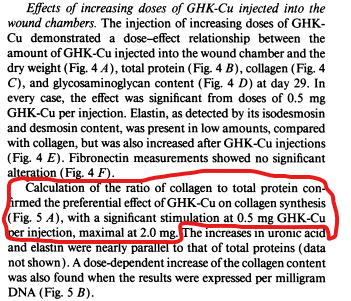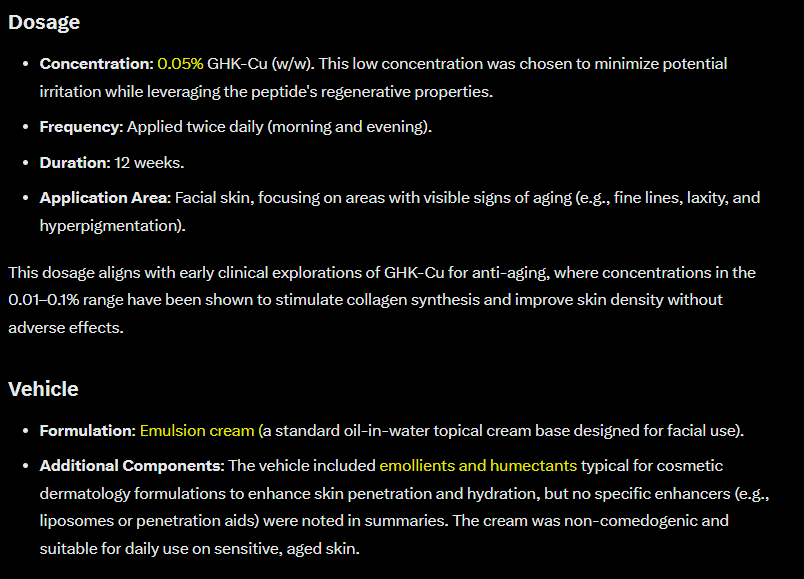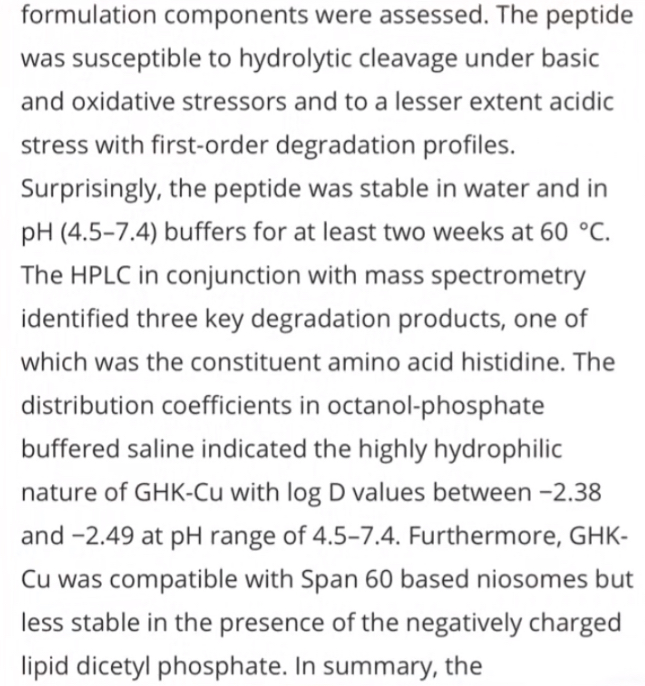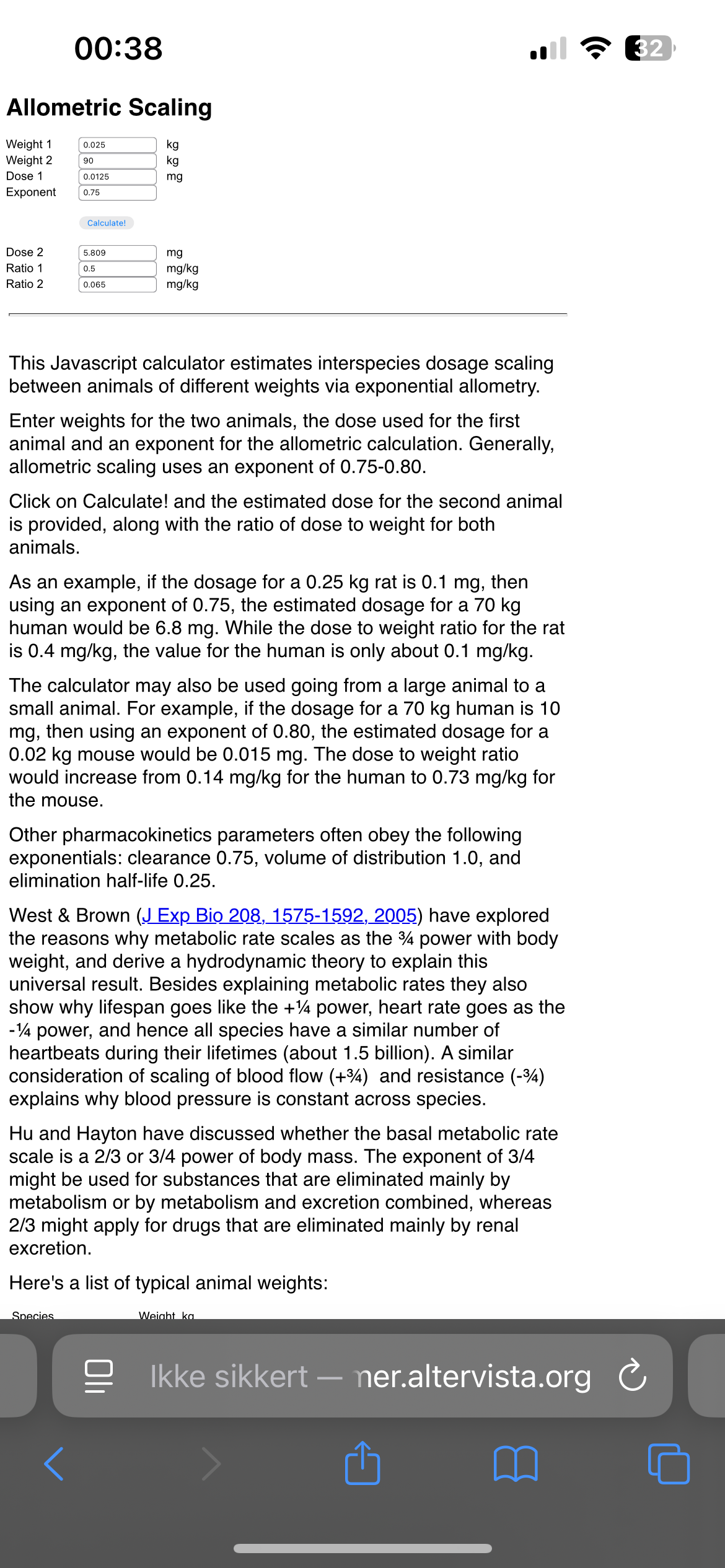skigmamigma
Iron
- Joined
- Jun 9, 2025
- Posts
- 81
- Reputation
- 66
So currently, the copper peptide GHK-CU has gained alot of fame for it's supposed collagen benefits. But can this peptide actually live up to its hype?

 pubmed.ncbi.nlm.nih.gov
pubmed.ncbi.nlm.nih.gov

 pubmed.ncbi.nlm.nih.gov
pubmed.ncbi.nlm.nih.gov
So recently a lot of people have been throwing around the supposed "benefits" of Systemic GHK-CU dosed daily from 2-5mg.
(Anti-aging, Improved skin & hair, Skin & collagen improvement)
But when you look into the literature the dose and the benefits simply do not correlate.
(Anti-aging, Improved skin & hair, Skin & collagen improvement)
But when you look into the literature the dose and the benefits simply do not correlate.
So you may be wondering why I say this - well, let me explain.

Here for example, we see a study of GHK-Cu being used on mice (like nearly all other GHK-Cu tests), and if you look where I drew the red circle, the study explains that they dosed the mice with 10 µg/g. doesn't sound like much, but that is actually 10mg/kg
And every single GHK-CU study you find out there, every single one dosed the subjects at over 0.5mg/kg for it to be "significant" as for example shown in this study by The Journal Of Clinical Investigation


Here for example, we see a study of GHK-Cu being used on mice (like nearly all other GHK-Cu tests), and if you look where I drew the red circle, the study explains that they dosed the mice with 10 µg/g. doesn't sound like much, but that is actually 10mg/kg
And every single GHK-CU study you find out there, every single one dosed the subjects at over 0.5mg/kg for it to be "significant" as for example shown in this study by The Journal Of Clinical Investigation

And unfortunately GHK-CU has one more major problem about it, that being the half life.
Now we don't actually know a lot about GHK-CU's half-life but it's estimated to be somewhere from 5 minutes to an hour.
Now we don't actually know a lot about GHK-CU's half-life but it's estimated to be somewhere from 5 minutes to an hour.
So with that being said, when we actually look at the data instead of the marketing, it becomes clear that systemic GHK-Cu simply doesn’t live up to the hype. But hypothetically let's say we use the copious dose that they used on mice in the studies. The average weight of a man in USA is 199 Pounds / 90 KG.
So as I said earlier the dose at which GHK-CU became significantly effective was 0.5mg / kg.
And if we apply that to the average weight of an American man, You would have to dose 45mg GHK-CU everyday

Just to put that into perspective, it would be more expensive to effectively dose GHK-CU monthly than HGH
So as I said earlier the dose at which GHK-CU became significantly effective was 0.5mg / kg.
And if we apply that to the average weight of an American man, You would have to dose 45mg GHK-CU everyday
Just to put that into perspective, it would be more expensive to effectively dose GHK-CU monthly than HGH

In vivo stimulation of connective tissue accumulation by the tripeptide-copper complex glycyl-L-histidyl-L-lysine-Cu2+ in rat experimental wounds - PubMed
The tripeptide-copper complex glycyl-L-histidyl-L-lysine-Cu2+ (GHK-Cu) was first described as a growth factor for differentiated cells. Recent in vitro data showed that it possesses several properties of a potential activator of wound repair. We investigated the effects of GHK-Cu in vivo, using...

Regenerative and Protective Actions of the GHK-Cu Peptide in the Light of the New Gene Data - PubMed
The human peptide GHK (glycyl-l-histidyl-l-lysine) has multiple biological actions, all of which, according to our current knowledge, appear to be health positive. It stimulates blood vessel and nerve outgrowth, increases collagen, elastin, and glycosaminoglycan synthesis, as well as supports...
Thank you for reading, I apologize if the formatting is not ideal as this is my first thread.









